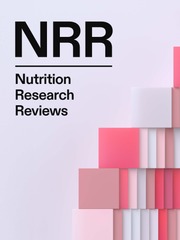Crossref Citations
This article has been cited by the following publications. This list is generated based on data provided by
Crossref.
Frewer, L.J.
2002.
Fruit and Vegetable Biotechnology.
p.
297.
Wilkinson, Susan B T
Rowe, Gene
and
Lambert, Nigel
2004.
The risks of eating and drinking.
EMBO reports,
Vol. 5,
Issue. S1,
Parry, Sharon M.
Miles, Susan
Tridente, Ascanio
and
Palmer, Stephen R.
2004.
Differences in Perception of Risk Between People Who Have and Have Not Experienced Salmonella Food Poisoning.
Risk Analysis,
Vol. 24,
Issue. 1,
p.
289.
Fischer, Arnout R. H.
De Jong, Aarieke E. I.
De Jonge, Rob
Frewer, Lynn J.
and
Nauta, Maarten J.
2005.
Improving Food Safety in the Domestic Environment: The Need for a Transdisciplinary Approach.
Risk Analysis,
Vol. 25,
Issue. 3,
p.
503.
Frewer, L.J.
and
Fischer, A.R.H.
2005.
Handbook of Hygiene Control in the Food Industry.
p.
103.
Fischer, Arnout R. H.
Frewer, Lynn J.
and
Nauta, Maarten J.
2006.
Toward Improving Food Safety in the Domestic Environment: A Multi‐Item Rasch Scale for the Measurement of the Safety Efficacy of Domestic Food‐Handling Practices.
Risk Analysis,
Vol. 26,
Issue. 5,
p.
1323.
Frewer, L.
and
Fischer, A.
2007.
Food Preservation by Pulsed Electric Fields.
p.
249.
Verbeke, Wim
Frewer, Lynn J.
Scholderer, Joachim
and
De Brabander, Hubert F.
2007.
Why consumers behave as they do with respect to food safety and risk information.
Analytica Chimica Acta,
Vol. 586,
Issue. 1-2,
p.
2.
Engelhardt, Katrin
Ahn, Byung Chul
Cho, Sung-Il
and
Joung, Hyojee
2007.
Predictors of interest in nutrition topics and willingness to participate in local nutrition programmes.
Journal of Public Health,
Vol. 29,
Issue. 1,
p.
9.
Kornelis, Marcel
De Jonge, Janneke
Frewer, Lynn
and
Dagevos, Hans
2007.
Consumer Selection of Food‐Safety Information Sources.
Risk Analysis,
Vol. 27,
Issue. 2,
p.
327.
Bergsma, Nynke J.
Fischer, Arnout R.H.
Van Asselt, Esther D.
Zwietering, Marcel H.
and
De Jong, Aarieke E.I.
2007.
Consumer food preparation and its implication for survival of Campylobacter jejuni on chicken.
British Food Journal,
Vol. 109,
Issue. 7,
p.
548.
de Jonge, J.
van Kleef, E.
Frewer, L.
and
Renn, O.
2007.
Understanding Consumers of Food Products.
p.
125.
Fischer, Arnout R. H.
and
Frewer, Lynn J.
2008.
Food‐Safety Practices in the Domestic Kitchen: Demographic, Personality, and Experiential Determinants1.
Journal of Applied Social Psychology,
Vol. 38,
Issue. 11,
p.
2859.
Verbeke, Wim
Vanhonacker, Filiep
Frewer, Lynn J.
Sioen, Isabelle
De Henauw, Stefaan
and
Van Camp, John
2008.
Communicating Risks and Benefits from Fish Consumption: Impact on Belgian Consumers' Perception and Intention to Eat Fish.
Risk Analysis,
Vol. 28,
Issue. 4,
p.
951.
Howard, Michael
and
Wignarajah, Keerthana
2008.
Perceptions of food hygiene risk in a group of Tamil food handlers living in the UK.
Journal of Foodservice,
Vol. 19,
Issue. 2,
p.
119.
Calzada, Pablo J.
and
Anderson-Worts, Paula
2009.
The Obesity Epidemic: Are Minority Individuals Equally Affected?.
Primary Care: Clinics in Office Practice,
Vol. 36,
Issue. 2,
p.
307.
Morgan, O. Ashton
Martin, Gregory S.
and
Huth, William L.
2009.
Oyster Demand Adjustments to Counter-Information and Source Treatments in Response to Vibrio vulnificus.
Journal of Agricultural and Applied Economics,
Vol. 41,
Issue. 3,
p.
683.
Landström, Eva
Hursti, Ulla-Kaisa Koivisto
and
Magnusson, Maria
2009.
“Functional foods compensate for an unhealthy lifestyle”. Some Swedish consumers’ impressions and perceived need of functional foods.
Appetite,
Vol. 53,
Issue. 1,
p.
34.
Leikas, Sointu
Lindeman, Marjaana
Roininen, Katariina
and
Lähteenmäki, Liisa
2009.
Who is responsible for food risks? The influence of risk type and risk characteristics.
Appetite,
Vol. 53,
Issue. 1,
p.
123.
Miguel Cunha, Luís
Pinto de Moura, Ana
Lopes, Zulmira
do Céu Santos, Maria
and
Silva, Isidro
2010.
Public perceptions of food‐related hazards: an application to Portuguese consumers.
British Food Journal,
Vol. 112,
Issue. 5,
p.
522.




